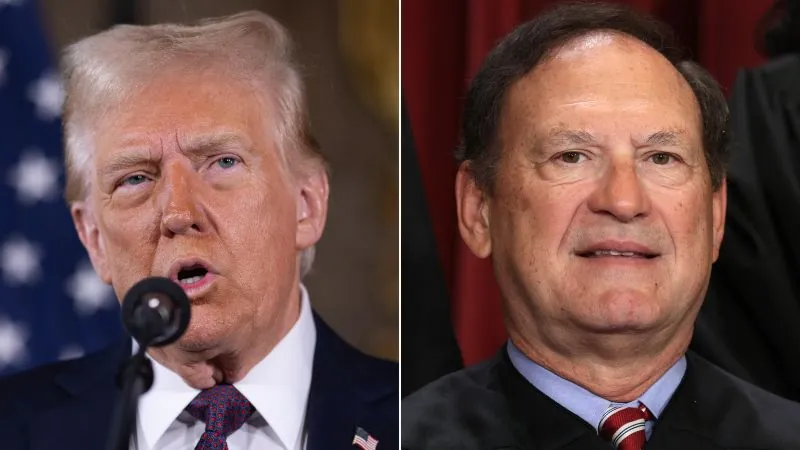
Alito’s Call with Trump Before Sentencing: A Controversial Connection?
2025-01-09
Author: Amelia
In a surprising twist of events, Supreme Court Justice Samuel Alito revealed that he spoke with President-elect Donald Trump just before Trump filed an emergency appeal to delay his impending sentencing related to a hush money case in New York. The conversation, centered around a former law clerk named William Levi, has raised eyebrows and questions about the potential influence of politics on the judiciary.
Alito confirmed in a statement that he received a call from Trump at the request of Levi, who is vying for a position in the upcoming administration. “William Levi, one of my former law clerks, asked me to take a call from President-elect Trump regarding his qualifications to serve in a government position,” Alito stated. However, he was quick to clarify that the conversation did not touch on Trump's legal troubles, including the emergency application he filed the very next day seeking to postpone his sentencing.
It’s common for justices to endorse former clerks for governmental roles, but the timing of this call—just a day before a major court filing connected to the first-ever criminal sentencing of a former president—has sparked criticism. Observers are questioning whether this meeting blurs the lines between judicial impartiality and political influence, particularly given the conservative majority on the Supreme Court, which Trump himself shaped with three nominations during his presidency.
Experts in judicial ethics have voiced concerns over Alito's dealings with Trump. The justice has been under scrutiny for his past associations that raise potential ethical dilemmas, especially as discussions heat up surrounding two controversial properties he owns in Virginia and New Jersey.
Alito reiterated that he was unaware of any pending legal discussions during his talk with Trump, stating, “We did not discuss the emergency application he filed today. In fact, I was not even aware that such an application would be filed at the time of our conversation.” He emphasized that their dialogue was purely about Levi’s qualifications and did not extend to any matters that could come before the Supreme Court.
The Trump transition team has yet to provide an official response to the media inquiries about this call. Gabe Roth, the executive director of Fix the Court, condemned the interaction, stating, “Trump, Alito, and Levi should know better, and they know no one in Congress or the judiciary will hold them accountable for ethics violations.” Roth added that although Levi is impressively qualified, the call served as an opportunity for Trump to engage with someone who will have a say in his legal future.
William Levi, who clerked for Alito and has an impressive resume that includes high-ranking positions in both the executive and legislative branches, did not respond to requests for comment. Currently, Trump faces significant hurdles in convincing the Supreme Court to block his sentencing, as emergency appeals are seldom entertained when related cases are still active in lower courts.
Amidst this controversy, some politicians, such as Rep. Tony Gonzales, have come forward in defense of the call, viewing it as beneficial for Open government dialogue across multiple sectors.
As this situation unfolds, many are left pondering the implications of such communications between a sitting justice and a president facing sentencing. Will this connection affect the integrity of the Supreme Court? Only time will tell.



 Brasil (PT)
Brasil (PT)
 Canada (EN)
Canada (EN)
 Chile (ES)
Chile (ES)
 Česko (CS)
Česko (CS)
 대한민국 (KO)
대한민국 (KO)
 España (ES)
España (ES)
 France (FR)
France (FR)
 Hong Kong (EN)
Hong Kong (EN)
 Italia (IT)
Italia (IT)
 日本 (JA)
日本 (JA)
 Magyarország (HU)
Magyarország (HU)
 Norge (NO)
Norge (NO)
 Polska (PL)
Polska (PL)
 Schweiz (DE)
Schweiz (DE)
 Singapore (EN)
Singapore (EN)
 Sverige (SV)
Sverige (SV)
 Suomi (FI)
Suomi (FI)
 Türkiye (TR)
Türkiye (TR)
 الإمارات العربية المتحدة (AR)
الإمارات العربية المتحدة (AR)